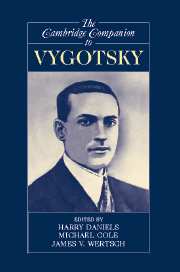Book contents
- Frontmatter
- Editors’ Introduction
- Part I: Vygotsky in Context
- Part II: Readings of Vygotsky
- Part III: Applications of Vygotsky’s Work
- 12 Pedagogy
- 13 Sociocultural Theory and Education of Children with Special Needs: From Defectology to Remedial Pedagogy
- 14 Putting Vygotsky to Work: The Change Laboratory as an Application of Double Stimulation
- References
- Index
13 - Sociocultural Theory and Education of Children with Special Needs: From Defectology to Remedial Pedagogy
from Part III: - Applications of Vygotsky’s Work
Published online by Cambridge University Press: 28 November 2007
- Frontmatter
- Editors’ Introduction
- Part I: Vygotsky in Context
- Part II: Readings of Vygotsky
- Part III: Applications of Vygotsky’s Work
- 12 Pedagogy
- 13 Sociocultural Theory and Education of Children with Special Needs: From Defectology to Remedial Pedagogy
- 14 Putting Vygotsky to Work: The Change Laboratory as an Application of Double Stimulation
- References
- Index
Summary
Was the issue of the development and education of children with special needs chosen by Vygotsky, or was it a chance encounter forced by circumstances? We may never be able to find a definitive answer to this question. Vygotsky left no diary, and the testimony of his colleagues does not shed much light on this issue. What is known with certainty is that young Vygotsky's original interests lay in the field of literature and humanities and apparently remained so following his graduation from Moscow University in 1917. The unmerciful reality of everyday life in his hometown of Gomel during the civil war (1918-1922), however, forced everyone - including Vygotsky - to seek any occupation that would make mere survival possible. For Vygotsky, a teacher's job, first at school and then at the Teacher Training College, was such an opportunity. It is apparently under these rather extreme circumstances that Vygotsky encountered the problem of children with special needs for the first time. As the head of the psychological laboratory at the Gomel Teacher Training College, Vygotsky was responsible both for teaching students the techniques of psychological evaluation and actually supervising these evaluations in schools (Van der Veer & Valsiner, 1991; Vygodskaya & Lifanova, 1996, 1999).
This link to the issue of special needs was further strengthened after Vygotsky's move to Moscow in 1924. As with his previous experiences in Gomel, we cannot be sure whether it was Vygotsky's growing interest in special-needs children or the social circumstances that led to his affiliation with the Section of Abnormal Children in the Peoples Education Commissariat of Education.
- Type
- Chapter
- Information
- The Cambridge Companion to Vygotsky , pp. 332 - 362Publisher: Cambridge University PressPrint publication year: 2007
- 19
- Cited by



